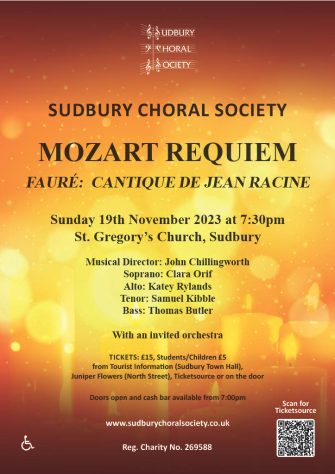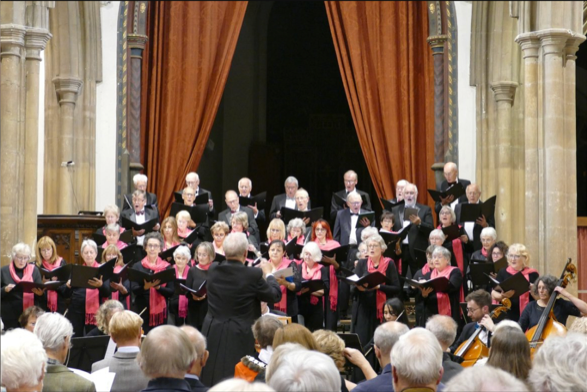 United Kingdom Fauré, Saint-Saëns, Handel, Mozart: Clara Orif (soprano), Abbie Ward (mezzo-soprano), Samuel Kibble (tenor), Thomas Butler (bass), Sudbury Choral Society / John Chillingworth (conductor). St Gregory’s Church, Sudbury, 19.11.2023. (CK)
United Kingdom Fauré, Saint-Saëns, Handel, Mozart: Clara Orif (soprano), Abbie Ward (mezzo-soprano), Samuel Kibble (tenor), Thomas Butler (bass), Sudbury Choral Society / John Chillingworth (conductor). St Gregory’s Church, Sudbury, 19.11.2023. (CK)

Fauré – Cantique de Jean Racine
Saint-Saëns – Mon coeur s’ouvre à ta voix (from Samson et Dalila)
Handel – 2 arias from the Messiah
Mozart – Il mio tesoro (from Don Giovanni); Exsultate Jubilate (1st mvt); Requiem
Up and down the land, choral societies are performing their eagerly awaited winter concerts – the fruits of their dedicated work since the end of summer – for the communities to which they belong. Many will be presenting seasonal fare – carols and the like; there will be many Messiahs; and some, like the Sudbury Choral Society, will be tackling one of the other pinnacles of the classical repertoire. The popularity of Mozart’s Requiem (another reasonably local society had performed it the previous night) is in some ways difficult to account for: it hardly seems suitable for the season. Aside from the complexities of its compositional history, and despite its many beauties, it takes a dark path towards the comfortless and uncompromising open fifth on which it ends.
Location is vitally important: and here the Sudbury Choral Society had an inestimable advantage in the airy and spacious fourteenth-century church of St Gregory, which proved to be an ideal acoustic envelope for a chorus of forty or so and an orchestra of twenty. This was immediately apparent in the opening item – Fauré’s youthful Cantique de Jean Racine – given a performance of engaging gentleness and restraint by orchestra and chorus. As for the Mozart Requiem, it was given an emotionally committed and sometimes overwhelming performance. John Chillingworth, conducting with clarity, purpose and unerring dramatic sense, inspired from his singers a response in which passion easily outweighed the occasional imprecision. In the big moments – notably the Dies Irae and the Lachrymosa – the intensity was there: generated, often, by a fearless cohort of sopranos.
The youthful quartet of soloists made the most of the glorious music Mozart wrote for them – in Cum vix justus, for example (sotto voce, following the Tuba mirum), and in the Recordare. As they always sing together (the bass solo in Tuba mirum apart), the conductor John Chillingworth had the fine idea of giving each of them a chance to shine before the interval: and as a result we were treated to a feast of fine singing. The mezzo-soprano Abbie Ward (replacing a previously advertised singer) displayed a rich, seductive and powerful voice in Dalila’s famous solo from Saint-Saëns’s Samson et Dalila (often translated as ‘Softly awakes my Heart’, a soppily Victorian sentiment which conveys nothing of the music’s erotic potency). Ward, singing beautifully and without histrionics, left us in no doubt of what Dalila was after. Samuel Kibble briefly, convincingly and stratospherically voiced Samson’s ecstatic response.
Thomas Butler’s imposingly sonorous and agile bass was heard to advantage in Handel’s Thus Saith the Lord (and also, after the interval, in Mozart’s Tuba mirum): and Ward displayed similar dexterity in For he is like a refiner’s fire (the showpiece of the aria But who may abide). Tenor Samuel Kibble then came into his own with Don Ottavio’s aria Il mio tesoro from Don Giovanni. Onstage, Don Ottavio can seem a bit of a drip next to the lusty Don: there was none of that here, with Kibble – tall, slim, upright – delivering a compelling account of the aria, and displaying outstanding breath control. Finally, soprano Clara Orif shone in the opening section of Mozart’s Exsultate Jubilate, singing with infectious brightness and joy.
These four singers – all young, all talented, all personable – are embarking, whilst still studying, on their professional careers. They are names to watch!
A word about the instrumental playing. In how many of Mozart’s works do the opening sounds steal into our ears and steal our hearts before we are aware? It was certainly so here: the sadly dragging strings, the dark plangency of clarinets and bassoons cast an immediate spell. The playing was fine throughout. It belatedly dawned on me that the double bass player a few feet in front of me was Neil Tarlton, for many years the section principal in the Philharmonia Orchestra. Some pick-up band!
Chris Kettle

Wowee – some review, and all I can add is that I thoroughly enjoyed the whole performance, as ever.
And I enjoyed sitting next to you, Tricia. Thank you for the card with the splendid picture of yourself in full Highland Piper regalia!
Very enjoyable evening with outstanding soloists. Well done to the choir it could not have been easy learning the evenings music looking forward to the Messiah in April.